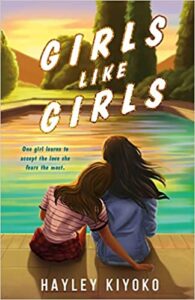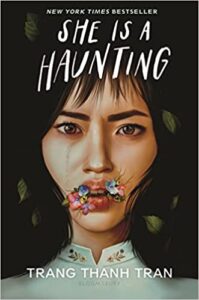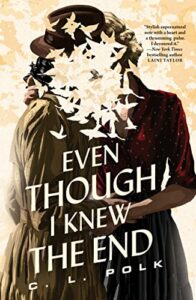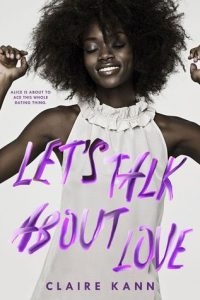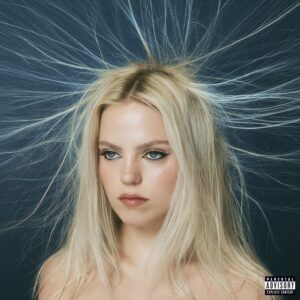
If you have Reneé Rapp’s album Snow Angel playing on repeat, these are the sapphic books you need to read! Pick up the one that matches your favorite song, or get the whole stack if it’s too hard to pick. You can get a copy of any of these titles from your local bookstore or library, or you can get a copy through Bookshop. Click here for Part One!
“Pretty Girls”
In the p.m., all the pretty girls/They have a couple drinks, all the pretty girls/So now, they wanna kiss all the pretty girls/They got to have a taste of a pretty girl
Pretty Girls is a song for people who keep falling for “straight” girls, and a celebration of those exploring their sexuality, even if it feels frustratingly drawn out to the other person. In the same vein, Girls Like Girls by Hayley Kiyoko, inspired by the sapphic anthem of the early aughts, follows the story of Coley and Sonya, two teenage girls in rural Oregon who each find themselves falling for the other girl. This lyrical debut novel fills out the gaps in the plot to Kiyoko’s music video, but balances the overall sweetness of the summertime romance with an exploration of grief and what it means to be out in today’s society. I think Pretty Girls would fit in beautifully during the summer romance montages that Girls Like Girls lays out.
“Tummy Hurts”
Now my tummy hurts, he’s in love with her/But for what it’s worth, they’d make beautiful babies/And raise ’em up to be a couple of/Fucking monsters, like their mother and their father
In Tummy Hurts, Rapp explores a past relationship through an analysis of heartbreak, grief, and bittersweet predictions of the continuing cycle of unhealthy relationships. This song contradicts and supports the exploration through using a childlike imagery of an upset stomach and the consequences of an unhealthy romance. If you are looking for a book that explores being haunted by a past relationship or dysfunctional relationships, I would recommend reading She is a Haunting by Trang Thanh Tran. In this horror young adult novel, Jade is visiting her estranged father and her only goal is to end the five-week visit with the college money he has promised her—but only if she can seem straight, Vietnamese, and American enough. However, Jade can’t ignore the effects of colonization on the house or a ghost bride’s warnings to not eat anything. She is a Haunting explores the concept of places being haunted by dysfunctional family dynamics, just as “Tummy Hurts” explores the haunting of a romantic relationship.
“I Wish”
I wish I could still see the world through those eyes/Could still see the colors, but they’re not as clear or as bright/Oh, the older we get, the colors they change/Yeah, hair turns to gray, but the blue’s here to stay/So I wish, I wish
“I Wish” is the Pisces moon of Snow Angel, with Rapp singing about how she wished she didn’t know about death as a concept. This sweet ballad mourns the loss of an important figure and the resultant loss of innocence in the world around her. Similarly, Honey Girl by Morgan Rogers explores themes of existential dread, fear of not living up to people’s expectations, and a loss of innocence once you grow up. Twenty-eight-year-old Grace Porter goes to Vegas to celebrate getting her PhD in astronomy, but accidentally ends up getting drunkenly married to a strange woman from New York. This triggers a rush of questions about herself, including why she doesn’t feel more fulfilled in her life, and Grace flees home to move in with her unfamiliar wife. Honey Girl is a story about self-growth, finding queer community, and taking a journey towards better mental health, and it honestly made me cry as much as I Wish did the first time I listened to it.
“Willow”
Don’t cry, don’t cry, Willow/I’ll cry, Willow/Willow/I’ll cry for you
Willow is another sad ballad, in which Renee talks to her younger self (metaphorically) under a willow tree, and tries to reassure them that everything will be alright. This concept of wanting to take away someone’s pain, regardless of your own, made me think of one of my favorite novellas, Even Though I Knew the End by C. L. Polk. Elena Brandt is the hardboiled detective of mystery noire past, with her private eye set up in a magical 1930’s Chicago, and a lady love waiting in the wings for her. However, Elena’s days are numbered and she decides to spend the last of them with said lady love, Edith. Just as she is about to leave the city, a potential client offers her $1,000 to find the White City Vampire, Chicago’s most notorious serial killer. To sweeten the pot, the client offers something more precious—the chance to grow old with Edith. As Elena dives into the affairs of Chicago’s divine monsters to secure a future with the love of her life, she learns that nothing is as she thought it was. If you want a read that will capture your mind and heart for an afternoon, then grab a copy of C. L. Polk’s Even Though I Knew the End.
“23”
But tomorrow I turn twenty-three/And it feels like everyone hates me/So, how old do you have to be/To live so young and careless?/My wish is that I cared less/At twenty-three
Finally, 23 explores the emotional turmoil and questioning that can come with turning twenty-three years old. Rapp’s lingering lyrics ask why she doesn’t feel like she has been succeeding in life, especially when compared to society’s expectations and assumptions about her career. By the end of the song, Rapp expresses the hope that she can grow into herself as a person and learn to love herself more by her next birthday. In the same vein, Let’s Talk About Love by Claire Kahn is about a nineteen Black year old college student named Alice, whose summer was going to be perfect until her girlfriend broke up with her for being asexual. Alice had planned on remaining single as to never experience being rejected for her sexuality again, but then she meets Takumi, and Alice has to decide if she’s willing to risk their friendship for a love that might not be reciprocated—or understood. A huge theme in Alice’s story is that of figuring out what you want to do and/or be as opposed to what your family and friends (or society) expects from you, whether it is about your sexuality or career choices. I think Alice would be wistfully listening to 23 right before the climatic third act, as she contemplates what to do.
Chloe (they/he) is a public librarian in Baltimore, who identifies as Indigenous, autistic, and panromantic demisexual. They enjoy reading queer literature for any age group, as well as fantasy, contemporary, and romance. In their spare time, they act in local community theaters, play D&D, and are halfway through their MLiS program. You can find them on Goodreads, Twitter, or Instagram.

